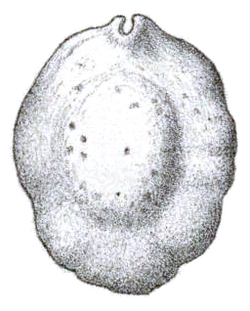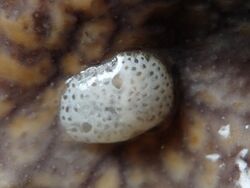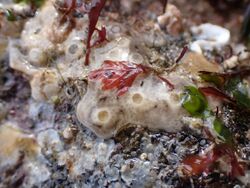Biology:Lamellaria latens
| Lamellaria latens | |
|---|---|

| |
| Drawing of dorsal view of live animal | |
| Scientific classification | |
| Domain: | Eukaryota |
| Kingdom: | Animalia |
| Phylum: | Mollusca |
| Class: | Gastropoda |
| Subclass: | Caenogastropoda |
| Order: | Littorinimorpha |
| Superfamily: | Velutinoidea |
| Family: | Velutinidae |
| Genus: | Lamellaria |
| Species: | L. latens
|
| Binomial name | |
| Lamellaria latens (O. F. Müller, 1776)[1]
| |
| Synonyms[1] | |
| |
Lamellaria latens is a species of small, slug-like sea snail, a marine gastropod mollusc in the family Velutinidae. It is native to the northeastern Atlantic Ocean and the Mediterranean Sea where it feeds on colonial ascidians (sea squirts).[2]
Description
The shell is not visible externally because it is completely covered by the mantle. The shell is thin, smooth and fragile, and consists of two whorls with an unobtrusive spire and a somewhat depressed profile. The largest whorl is equivalent to the total height of the shell. The aperture is extremely wide. There is no operculum and the maximum dimensions of the shell are 9.5 by 5 mm (0.4 by 0.2 in). The part of the animal that is visible is the mantle, and this is smoother and less domed than the rather similar Lamellaria perspicua. It grows to about 10 mm (0.4 in) long by 6 mm (0.2 in) wide and is oval in shape, with a siphonal notch at the front. The colour varies but tends to be some shade of tan or brown, with darker flecks.[3]
References
- ↑ 1.0 1.1 Marshall, Bruce (2016). "Lamellaria latens (O. F. Müller, 1776)". WoRMS. World Register of Marine Species. http://www.marinespecies.org/aphia.php?p=taxdetails&id=140172.
- ↑ "Lamellaria latens (O. F. Müller, 1776)". BioInfo (UK). https://www.bioinfo.org.uk/html/Lamellaria_latens.htm. Retrieved 17 March 2019.
- ↑ "Lamellaria latens". Mollusca of the North Sea. Marine Species Identification Portal. http://species-identification.org/species.php?species_group=mollusca&id=752. Retrieved 10 March 2019.
Wikidata ☰ Q4931561 entry
 |







